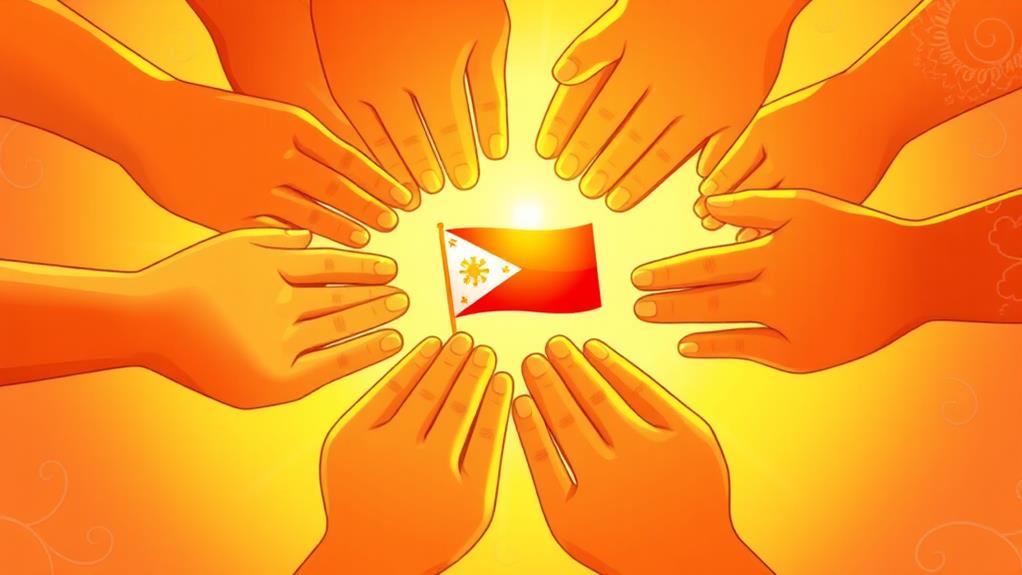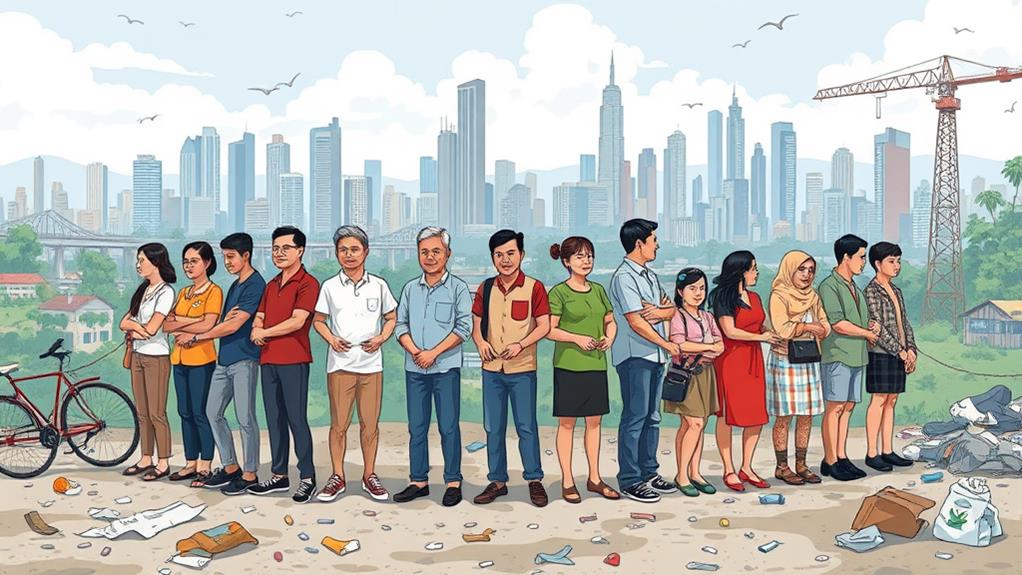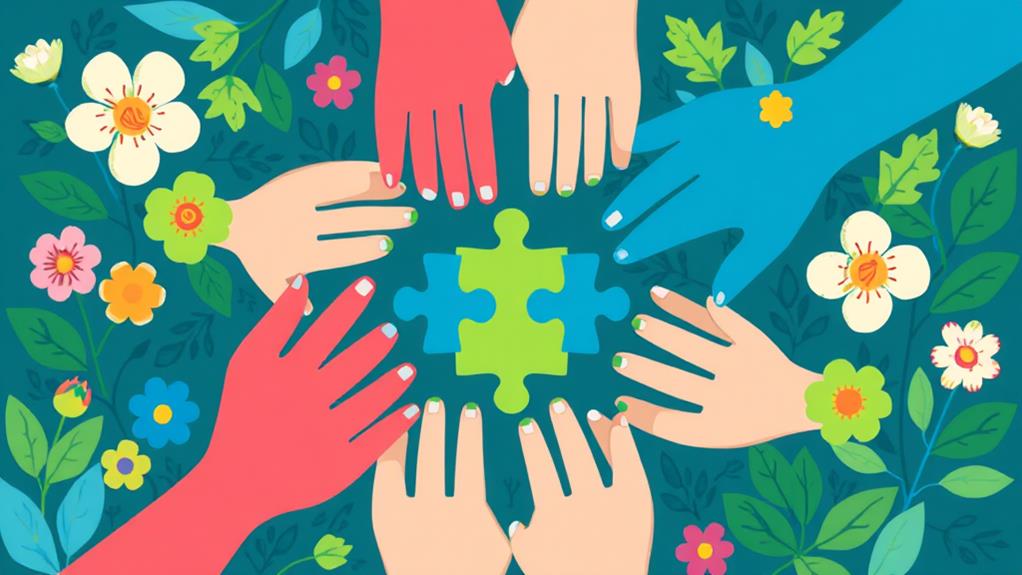Bayanihan is the spirit of cooperation and communal unity that drives the strong social bonds in Filipino culture. This spirit brings individuals together to overcome challenges and celebrate triumphs, fostering a sense of community and shared responsibility.
In traditional Filipino communities, bayanihan is demonstrated through collective efforts to relocate homes, pool resources, and support local projects. For instance, when a family needs to move to a new home, the entire community comes together to help, sharing the workload and providing necessary resources.
This collective action emphasizes the importance of helping others and promotes a sense of shared responsibility. Through bayanihan, Filipinos have been able to overcome challenges and achieve common goals, shaping the nation's history and inspiring its people today.
Understanding Bayanihan Spirit

Bayanihan: A Spirit of Communal Unity and Cooperation
Bayanihan is more than a cultural tradition; it's a way of life that embodies the Filipino spirit of cooperation. At its core, Bayanihan signifies a spirit of communal unity and cooperation in achieving common goals. This concept is deeply rooted in Filipino culture, reflecting values such as selflessness, hospitality, and solidarity.
Traditionally, Bayanihan involved neighbors helping one another in tasks like relocating homes. This collective effort showcased the joy of working together towards a common goal.
Today, the practice has evolved to encompass broader civil efforts that address social issues, emphasizing the importance of community support in contemporary society.
The Bayanihan spirit encourages collective responsibility, highlighting the significance of unity and cooperation in overcoming modern challenges. By working together, individuals can achieve more than they could alone.
For example, in times of natural disasters, Bayanihan spirit inspires communities to come together to provide aid and support to those affected.
Understanding Bayanihan provides insight into the Filipino culture's emphasis on helping one another and the power of collective action. This spirit of cooperation is a beacon of hope, inspiring individuals to work together towards a common good.
Expressions of Filipino Cooperation
Bayanihan: A Vibrant Expression of Filipino Cooperation
Bayanihan, the Filipino spirit of cooperation, is manifested in diverse and vibrant ways.
When a community comes together to help a family relocate their house, it's a classic example of bayanihan in action. This collective effort not only achieves a practical goal but also creates a festive atmosphere, showcasing the spirit of communal unity.
Bayanihan goes beyond physical labor. Community groups pool their resources to fund collective causes, demonstrating the spirit of unity in addressing shared challenges.
For instance, community members may contribute to a common fund to support a local project or initiative. This collective approach fosters a sense of togetherness and cooperation among community members.
Participation in communal activities like festivals and feasts reinforces bayanihan. These events bring community members together, fostering a sense of collective joy and shared identity.
Traditional practices like singing and dancing during these events emphasize collective joy and shared identity. Even major projects in villages rely on bayanihan, where collective efforts lead to the successful completion of tasks that benefit the entire community.
This highlights the importance of teamwork in Filipino culture.
Bayanihan in Times of Crisis

Bayanihan: The Filipino Spirit of Cooperation in Crisis
In times of crisis, the Filipino spirit of bayanihan shines brightly, manifesting in selfless acts of unity and solidarity. When natural disasters strike, communities come together, putting aside differences to provide relief and support to those affected.
Bayanihan in Action
Volunteers and government agencies collaborate to facilitate recovery efforts, showcasing the resilience and strength of the Filipino community. For instance, during Typhoon Haiyan in 2013, local volunteers and international organizations worked together to distribute aid and rebuild damaged areas.
The Spirit of Bayanihan
Selfless assistance without expectation of reward is at the heart of bayanihan, emphasizing the importance of unity during challenging times. This spirit is rooted in Filipino cultural values of hospitality, togetherness, and solidarity, which are crucial for community recovery.
Historical Examples
Historical instances of bayanihan in crises highlight the Filipino cultural values of hospitality, togetherness, and solidarity. For example, during World War II, Filipino guerrilla fighters worked together with American forces to resist Japanese occupation.
Long-term Impact
The collective efforts during emergencies not only address immediate needs but also foster long-term relationships and trust among community members, enhancing future cooperative initiatives.
By working together, communities build stronger bonds, making them more resilient in the face of adversity.
Bayanihan: A Way of Life
In times of crisis, bayanihan is more than just a concept – it's a way of life, a testament to the power of unity and cooperation in the face of adversity.
Cultural Significance and Values
Bayanihan: A Pillar of Filipino Cultural Values
Bayanihan is a fundamental aspect of Filipino culture, extending beyond its role in times of crisis to shape community interactions and perceptions of collective responsibility.
The concept is derived from the Filipino word "bayan," meaning community, and embodies a spirit of communal unity and cooperation.
This cultural value promotes selflessness, emphasizing helping others without expecting material rewards.
In practice, bayanihan is demonstrated when neighbors come together to assist a family in relocating, highlighting the importance of collective effort and support within the community.
Beyond physical labor, bayanihan also involves moral and financial support through community funds for collective causes, showcasing its multifaceted nature.
By embracing bayanihan, individuals become part of a community that prioritizes collective well-being over individualism, fostering a sense of belonging and social responsibility.
Contemporary Relevance and Challenges

The Bayanihan Spirit: A Vital Anchor in Modern Times
As the Philippines faces modern challenges like urbanization and individualism, the bayanihan spirit remains essential in promoting interdependence and collective responsibility.
Countering the Crab Mentality
The bayanihan spirit helps counter the Crab Mentality, which fosters selfishness and social fragmentation.
By prioritizing community well-being over personal gain, individuals can work together to address social issues that affect them directly.
Building Trust and Collaboration
Bayanihan is crucial in building trust and collaboration among community members, which promotes mental health awareness and addresses systemic barriers to healthcare access.
This collective effort leads to stronger, more cohesive communities.
Inspiring Civic Efforts
The bayanihan spirit inspires civic efforts and movements, encouraging individuals to engage in volunteerism and collective action.
This leads to a stronger, more cohesive society where individuals work together to address social issues.
Mobilizing Communities During Crises
Bayanihan is essential in mobilizing communities quickly during crises like natural disasters, exemplifying resilience and solidarity.
Reviving the Bayanihan Tradition
Reviving Bayanihan: A Tradition of Unity and Cooperation
The bayanihan spirit, a Filipino custom that promotes collective success, can be revitalized by looking to the past for inspiration.
In the past, neighbors would come together to help a family relocate by carrying their house using bamboo poles. This tradition can be reinvigorated to counteract the negative effects of Crab Mentality, which prioritizes individual gain over collective success.
Bayanihan promotes national pride and aspirations. Community events and initiatives that celebrate bayanihan can enhance national pride and aspirations, helping Filipinos to excel globally through unity and cooperation.
Educational programs and grassroots movements can lead the revival of the bayanihan tradition, fostering a stronger, more cohesive society that values collective well-being over individualism.
By embracing bayanihan, a sense of community and shared responsibility is created. This emphasizes teamwork and collective success, building a society that's more united, more cooperative, and more resilient in the face of challenges.
How does the Filipino value of Pakikisama relate to the concept of Bayanihan?
The Filipino value of pakikisama emphasizes the importance of harmonious relationships within a community. This value is closely related to the concept of Bayanihan, which highlights the spirit of communal unity and cooperation in achieving common goals. Both pakikisama and Bayanihan promote solidarity and mutual support among the members of the Filipino community.
Path Forward for Filipino Society

Bayanihan Spirit: A Path Forward for Filipino Society
Harnessing Collective Power
Filipino communities are poised to overcome challenges by reviving the bayanihan spirit, which harnesses collective power to drive progress.
Benefits of Embracing Bayanihan
By embracing bayanihan, Filipino communities can:
Foster Respect and Tolerance
Embracing bayanihan encourages collaboration among community members, fostering respect and tolerance in various aspects of life.
For instance, neighborhood clean-up initiatives bring people together, promoting unity and understanding.
Achieve Greater Success Through Teamwork
Bayanihan emphasizes teamwork and mutual support, leading to greater achievements for all individuals.
In a school setting, students working together on projects develop essential skills, such as communication and problem-solving, to achieve better results.
Prioritize Cooperation Over Individualism
By prioritizing cooperation over individualism, bayanihan enhances national pride and aspirations.
For example, local businesses partnering with each other to support a community event promotes a sense of shared ownership and responsibility.
Counter the Negative Effects of Crab Mentality
Bayanihan counters the negative effects of the Crab Mentality, improving social trust and collaboration.
Frequently Asked Questions
What Is the Bayanihan Spirit in the Philippines?
The Bayanihan spirit is a cultural heritage in the Philippines that embodies community support and mutual assistance.
This spirit is about people coming together to help each other in times of need, showcasing the country's values of hospitality, solidarity, and community spirit.
It's a beautiful display of selfless help, reinforcing resilience and cooperation among Filipinos.
For instance, during natural disasters like typhoons or earthquakes, neighbors and community members come together to provide aid, shelter, and emotional support to those affected.
This collective effort helps build a sense of unity and cooperation, enabling the community to overcome challenges more effectively.
What Does the Bayanihan Symbolize?
The Bayanihan spirit represents community support and collective action. This concept embodies the idea that individuals come together to help one another, prioritizing the well-being of the community over personal gain.
In the Philippines, where the Bayanihan originated, it's a testament to the country's rich cultural heritage. By working together towards a common goal, individuals can achieve more than they could alone.
For example, in times of disaster or crisis, the Bayanihan spirit enables communities to quickly respond and provide support to those in need.
What Does Bayanihan Literally Mean?
What does "Bayanihan" literally mean? It translates to "being in a bayan," where "bayan" means town, nation, or community. This phrase originates from the concept's roots, emphasizing communal unity.
Historically, Bayanihan symbolized collective efforts, like neighbors helping each other relocate.
Today, its modern applications extend beyond traditional practices, but its essence remains: people coming together to achieve common goals, fostering a strong sense of community and selflessness.
Is Bayanihan a Filipino Value?
Bayanihan is a Filipino value. This value reflects the cultural heritage of Filipinos, emphasizing community support and collective action to achieve common goals.
In the Philippines, Bayanihan is demonstrated through various practices, such as neighborhood cooperation where individuals work together to accomplish tasks like moving houses or repairing roads.
This sense of unity and cooperation has become an integral part of Filipino identity, shaping the way people interact and respond to challenges.